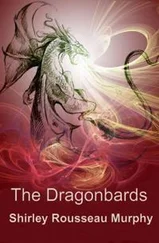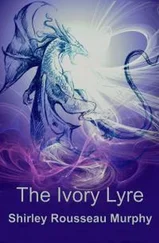“Likely,” he says shortly, starting on another blade; then, “Devils, some say.” He goes on with the grinding.
Then later, “Devils. Curse on ‘em, some say! You feed ‘em, good luck, but harm those ponies, that’s the end of luck for you, girl. Happened more than once. Old man Greeb, he lost his whole flock, nine hundred sheep, he lost. Got the sickness. Shot a Sand Pony, fed it to his dogs. Lost ‘em all, all nine hundred.” He turns to finish the blades, leaving Karen to pet Bo and wonder.
“Another time,” he continues, finished with the blades, “man came down from the city, brought trucks, said those were wild ponies and no season on ‘em, was gonna catch ‘em up and sell ‘em, no one could stop him, all legal, he said. Well, legal it may have been, but catch ‘em, he didn’t. Ran right over him, the whole great stampeding bunch of ‘em, right down in Middle Canyon, there. Folks around here, they let those ponies alone. Less it’s to feed ‘em in the winter. Brings good luck, that does. Larry Crail, he had twins and a record litter of hogs and a whole full dozen good speckled pointers, all in one year. And cleared a cool twenty thousand, besides,” he adds. “Fed ‘em all winter, Larry did.” He spits onto the sawdust floor and turns to make Karen’s change, giving her a bill and putting the blades back into their envelopes. “Get your wish, likely,” he says. “You don’t look a mean one to me, miss!”
She gives him the order for glass, for feed and a batch of chicks—“Need a brooder for ‘em now, deliver ‘em in a couple of weeks, be all right,” he says-collects the twins, and goes out into the street.
The village is small, huddled together comfortably at the base of the hills, its streets crooked and its roofs climbing between the hills on one side and dropping down to a meadow on the other. There is a stream running through town, and Karen wonders if the Sand Ponies ever come here to drink. She guesses not.
“There’s the schoolhouse,” says Lisa as they pass a small white box of a building with a bell on the top. “We’ll go there this year,” she says, “but we can already read. First grade’s for babies!” Karen laughs at her.
Karen looks up. Someone is looking at her, staring. He is a white-bearded man, with very blue eyes. A tramp? He looks like one. He goes on by, and she turns to watch as he makes his way down the street and around the corner, out of sight. Hmm, wonder what he was staring for, Karen thinks, then puts him out of her mind as the grocery appears before her. She digs for the list and goes in.
Mary McCamley looks too slight, too city-bred, to be driving her old brown jeep down the village street, too neat and lady-like. Abbey sits on the back of the seat with a paw on Mary’s shoulder, purring and looking around as if she likes what she sees of the village.
“There is the schoolhouse,” says Mary, stopping the jeep in a cloud of dust. She sits there for a minute, looking; then she climbs out of the jeep and goes up the steps to peer in the window. She tries the door. It is locked, of course, but through the window Mary can see the blackboard, rows of desks, the teacher’s desk in front—my desk, thinks Mary—chalk still in the holder, big old dictionary on a table near the window, coat rack, all the usual things, the comfortable things. Mary smiles. She is holding Abbey, whose tail suddenly twitches, making Mary look around.
“School’s not open, not till fall.”
“No summer school?” says Mary, knowing there is not. She faces a grubby little girl not more than six, escorted by a big hound who seems to be smiling at Abbey.
“Oh, no! Never have school in the summer,” says the child. “Weather’s too nice for that! Come fall, though, bell’l ring, teacher’ll come—new teacher, we’re getting—then we’ll read Shakespeare!”
Mouth open, eyes wide, Mary stares for a minute. Shakespeare, indeed! “Can you read?” she asks the child, putting Abbey down to nose at the dog as she seems determined to do.
“Of course we can! Read the newspaper. Come fall, read Shakespeare!” the child repeats.
“We?” Mary says, looking around.
“Twins,” the child says shortly. “In the grocery. Here she comes.”
From the door of the small country market comes a whole passel of children, varying somewhat as to size and degree of dirtiness. There is no difficulty in recognizing the other part of ‘we’ … The spit ‘n’ image, thinks Mary McCamley. Wonder if she plans on Shakespeare, too!
The second twin is eating a licorice, and holds another out to her sister. She extends a third to Mary, shyly, and Mary takes it, smiling.
Then everyone is quiet, staring. Some are petting the cat.
The children look at the jeep, at Abbey, at Mary more closely; then two go to peer inside the jeep. There is luggage there, and boxes of books. There is a world globe and a songbook.
The children stare again; then one says, “You’re the new teacher! You’re very early, though.”
Mary smiles. “Yes. Well, do you mind?”
“You’ll not start school yet?”
“Oh, no. Just want to get settled and wade in the ocean first.”
This sounds sensible to the children, and they begin an alluring discussion of where Mary McCamley is to stay.
“Hotel,” says one. “Last teacher stayed there.”
“Too old,” says another. “Food’s no good. My pop says so.”
“I’d like a small cottage near the beach,” cuts in Mary, wondering if anyone will take her suggestion.
“Of course,” says one big girl. “That would be best.
But where? Everything is taken, summertime. City folk,” she says, not kindly. “Come school, you’ll have no trouble, hut now, everything’s full!”
“Hmmm,” says Mary McCamley. “Well, I will stay in the hotel until then, that’s all.”
“You won’t like it,” says one darkly.
“Pitch a tent,” says another, delighted with the idea.
“That’s a thought,” says Mary, weighing the possibility of frowning city fathers and no job after all.
“Won’t take your cat, the hotel,” says a third.
“Oh, dear,” says Mary.
“We will,” says Lisa. The twins have been very quiet, listening, and watching Bo to see he doesn’t get scratched.
“We will keep you and your cat,” Jana pipes. “For the summer. Sleep on hay, you must. Or maybe get a cot, could do that, I guess.” They grab each other suddenly and do a wild, circular dance in and out among the other children. “Real live teacher, right at home,” shrieks Jana. Mary McCamley looks alarmed.
“Teach us Shakespeare,” shouts Lisa. Mary looks helplessly about her, but all the children seem delighted with the idea. What is she to do?
Well, first things first, and she untangles herself and Abbey from the children and prepares to make her duty calls to the school board and such. She puts Abbey safely in a large cage in the jeep, straightens her hair, and dusts off her shoes. The twins watch silently, and then Lisa steps up and begins to give directions. Her brown eyes are bold, but steady. Her directions are careful, with a ring of authority. “But what will your family say,” asks Mary McCamley, “if I come barging in?”
“Papa will be very pleased,” says Lisa. “So will all of us, specially Sarah Paddyfoot. You’ll see!”
“Well, all right,” says Mary, smiling.
It is at the jailhouse that Mary McCamley must present herself. How funny, she thinks. Oh, well. She goes up the steps, sensibly leaving Abbey in the car. There is a small waiting room with no one there to ask anything of, but through a door she can see part of a desk, some large feet propped up on it, and there is the smell of cigar smoke.
Knocking at the half-open door, Mary peers in. Three men sit there, one with his feet on the desk, two lounging comfortably. There is a great struggle to arise as she appears before them. She protests, but, no, finally, their coffee nearly spilled, they are all up and smiling at her. One, who seems in charge, must be the sheriff. The bearded one seems shy, perhaps ashamed of his ragged clothes. The other man, wearing Levi’s and boots, makes himself ready to leave.
Читать дальше
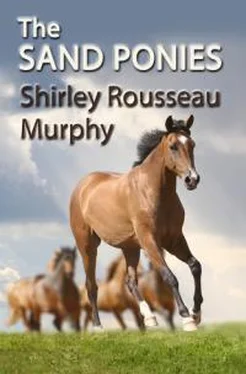
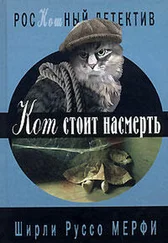
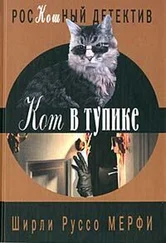
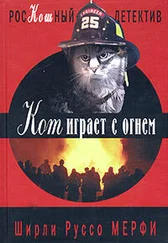

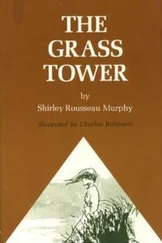
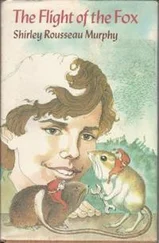
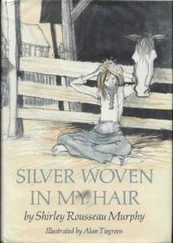
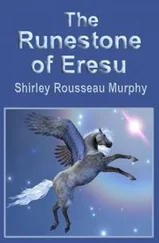
![Ширли Мерфи - The Shattered Stone [calibre]](/books/436059/shirli-merfi-the-shattered-stone-calibre-thumb.webp)
